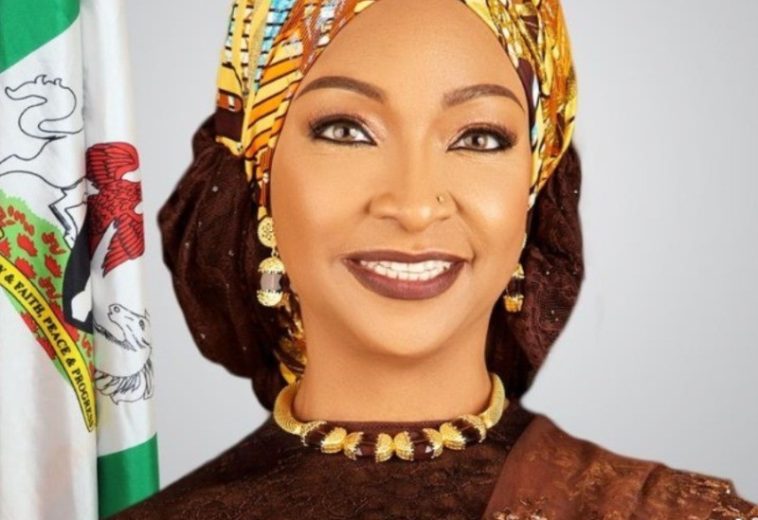The role of the First Lady in Nigeria has attracted a lot of interest since the country’s 1999 democratic transition. These women, who are the wives of presidents, are involved in many facets of Nigerian society, from ceremonial work to social cause campaigning. From 1999 until 2023, Nigeria’s First Ladies have made significant contributions to society and will be examined in this article along with their effects on policy, governance, and societal advancement. According to Ngozi Okonjo-Iweala, Nigeria’s First Ladies are the unsung heroes, championing causes that uplift the nation’s most vulnerable.”
Stella Obasanjo (1999-2005): A Legacy of Care
Stella Obasanjo, wife of President Olusegun Obasanjo, is remembered for her warmth and her focus on social issues. She was a self-described political activist who championed themes like women’s emancipation, youth leadership in the future, and the reconstruction of a Nigeria devastated by war.
Following her husband’s election to the presidency in 1999, Obasanjo became the First Lady of Nigeria and formed the Child Care Trust to provide for the needs of impoverished and/or disabled children.
She also joined the fight against female genital mutilation while serving as First Lady of Nigeria, and on February 6, 2003, she proclaimed the day as the International Day of Zero Tolerance to Female Genital Mutilation.
2007-2010: Turai Yar’Adua’s Advocacy and Influence
Turai Umar Musa Yar’Adua’s influence extended beyond traditional First Lady roles, as she was perceived as a powerful figure within her husband’s administration. Some critics argued that she wielded undue influence over governmental affairs, prompting discussions about the extent of First Ladies’ involvement in governance. Despite controversy, Turai Yar’Adua’s advocacy for healthcare and women’s empowerment left a lasting impact on Nigerian society.
Dame Patience Jonathan: A Champion of Philanthropy and Women’s Empowerment
Dame Patience Faka Jonathan, formerly known as Patience Iwari, served as the First Lady of Nigeria from 2010 to 2015 and as the second lady from 2007 to 2010, alongside her husband, former President and Vice President Goodluck Ebele Jonathan. Prior to her tenure as First Lady, she held the position of Permanent Secretary in Bayelsa State.
Throughout her time in public service, Dame Patience Jonathan has been acclaimed for her philanthropic endeavors and political acumen, both nationally and internationally. She has received several awards recognizing her contributions, including the “Beyond The Tears” International Humanitarian Award in 2008 for her efforts in the global fight against HIV/AIDS, the African Goodwill Ambassador Award in the same year, and the “Wind of Change” Award from the South/South Women’s Organization.
During her husband’s tenure as governor of Bayelsa State from 2005 to 2007, Patience Jonathan served as the state’s First Lady. During this period, she initiated numerous philanthropic and women empowerment programs, including the A-Aruere Reachout Foundation (AARF), aimed at enhancing the status and economic opportunities of Nigerian women and youths. Additionally, the foundation focuses on providing support to children with heart-related ailments, reflecting her commitment to addressing critical health issues within society.
2015-2023: The Quiet but Powerful Influence of Aisha Buhari
Aisha Buhari assumed the role of Nigeria’s First Lady following her husband Muhammadu Buhari’s election in 2015. Unlike her predecessors, Aisha Buhari adopted a more reserved approach to her role, focusing on advocacy and humanitarian work. She launched initiatives such as the “Future Assured” program, which aimed to improve healthcare, education, and women’s empowerment across Nigeria.
Aisha Buhari’s tenure was characterized by her willingness to speak out against societal ills, including corruption and social injustice. Her advocacy for good governance and accountability earned her both praise and criticism, highlighting the complex dynamics of the First Lady’s role in Nigerian politics.
Aisha Buhari, known for her advocacy of women’s and children’s rights, Aisha emphasizes the importance of education for girls and speaks out against child marriage and homosexuality. At global forums, she calls for legislation to protect Nigerian women from forced marriages and sex trafficking. Aisha has also supported mothers of abducted Chibok girls and donated proceeds from her book to victims of violence. In 2016, she criticized her husband’s government, prompting a controversial response. Recently, she attended the launch of a book detailing her life experiences, attended by Vice President Osinbajo and other dignitaries.
Senator Oluremi Tinubu: A Beacon of Hope and Empowerment in Nigerian Politics
Oluremi Tinubu, born on September 21, 1960, hails from the Ikusebiala family of Ogun State, and she is the present first lady of Nigeria. A Nigerian politician, she has held various significant positions throughout her career. She served as the First Lady of Lagos State from 1999 to 2007 during her husband’s tenure as governor and later represented Lagos Central Senatorial District at the Nigerian National Assembly from 2011 to 2023. A member of the All Progressives Congress (APC), she has been a consistent voice for her constituents, focusing particularly on marginalized groups.
Senator Tinubu’s impact is evident in her dedication to public service and numerous constituency projects. Notable among these projects are the Abimbola Jakande Obstetrics and Gynaecology Centre, which promotes women’s health, and the Lyaloja-General Folasade Tinubu-Ojo Model Market, supporting local commerce. Her initiatives, such as distributing grinding machines and implementing youth empowerment schemes, have empowered thousands, fostering entrepreneurship and self-reliance.
Recognized for her contributions, Senator Tinubu has received prestigious awards such as the Officer of the Order of the Niger (OON) for her outstanding service to Nigeria. Internationally, she has been honored with the Ghana Noble International Award for Leadership and the Gambian Diamond Award for her efforts in poverty alleviation.
Senator Oluremi Tinubu’s political journey reflects a blend of leadership and compassion, leaving a lasting impact on her constituents. Her tireless advocacy for the marginalized and commitment to societal development underscore her unwavering dedication to public service.


